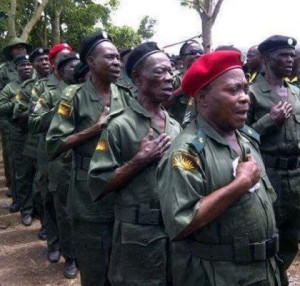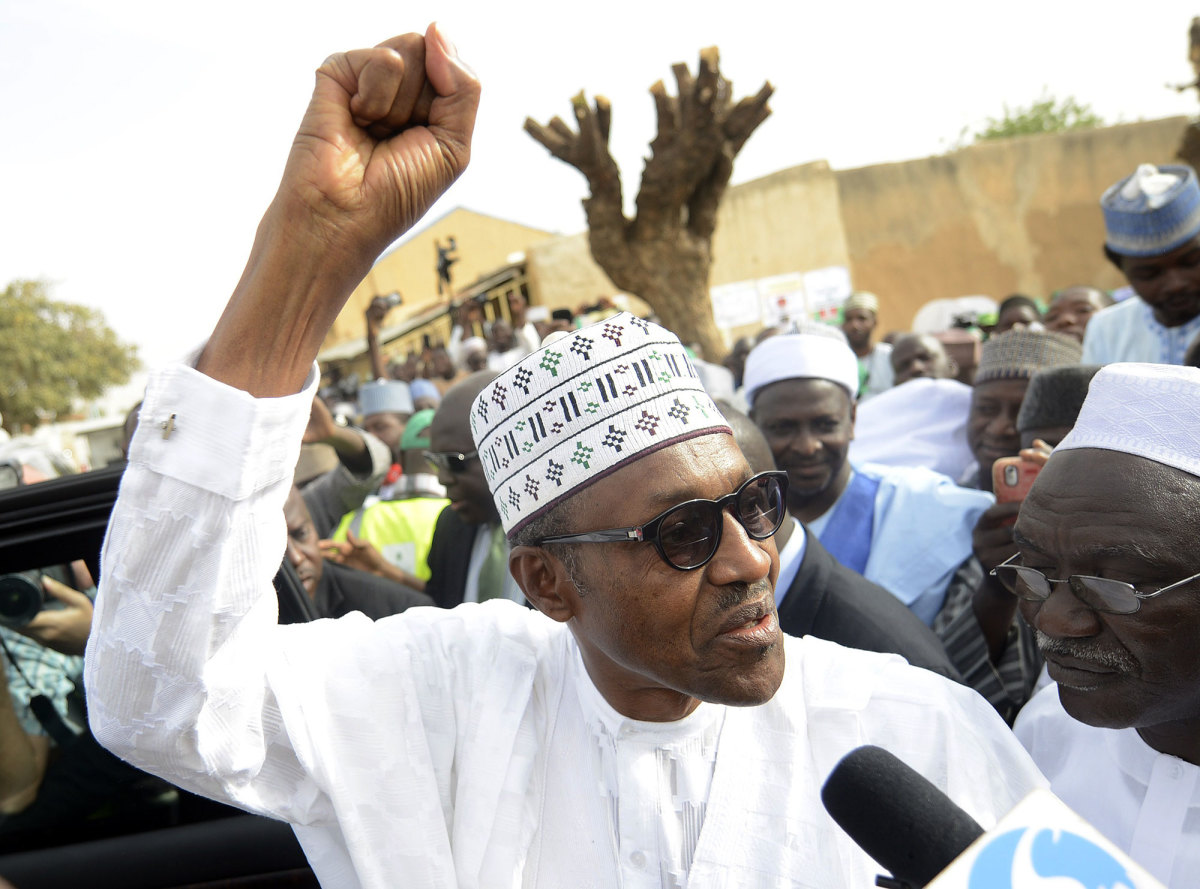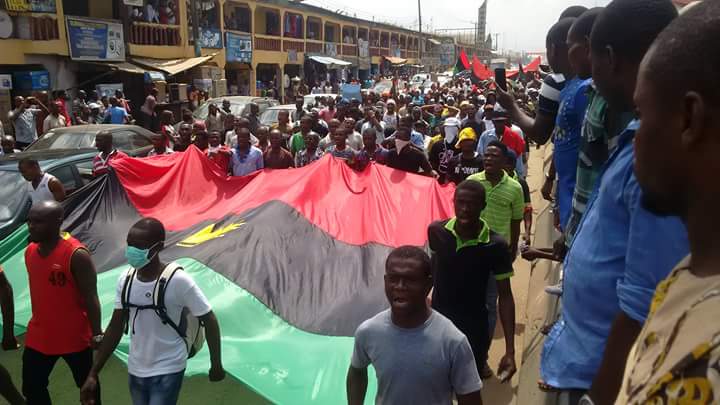by Jide Ajani
Deal with it: He may have taken more than three months but President Muhammadu Buhari would need to deal with the growing discontent coming from the South-East. His direct silence or, better put, seeming indifference, or both, has, one way or the other, contributed, in no small measure, to the spark that has happened on members and leaders of the Indigenous People of Biafra, IPOB – and the Movement for the Sovereign State of Biafra, MASSOB, riddled by in-fighting, is playing catch up with relevance.
But beyond the noise, needless braggadocio of the Nigerian state and somewhat uncreative approach to dealing with the agitation, is the lack of a clear understanding of why nations fail.
Every nation seeks the total sum of good for its people. One of the ways this is done is by unlocking the creative potentials. Since after the civil war, what ordinarily ought to have been a Marshall Plan of sorts for the South-East was never engaged. Worse still, some self-appointed leaders of the zone have engaged in serial short-changing of their people by placing the pursuit of filthy lucre above the welfare of Igbos. Until the destruction wrought by the war in the North-East, some parts of the South-East looked and still look like fresh topography of war owing to neglect, un-development and underdevelopment. When there is inequality, it breeds poverty. Poverty in turn breeds instability of many forms. Instability breeds further poverty. This is not just because it has to do with the Igbo nation. It is the way the Nigerian state is structured for development by leaders whose parochial appreciation of governance is best underscored by the failed leadership and wasted opportunities of the last 16-years.
Whatever grievances the Igbos are crying about today, many parts of Nigeria typify that neglect.
But there is a nexus between good governance, rule of law and prosperity. Which is why good governance, justice and equality would always be a sine-quanon for development and prosperity.
The following, excerpted from the book, Why Nations Fail, by Daron Acemoglu and James A. Robinson, creates the linkage between Africans, laziness, despotism, good governance and prosperity:
“One widely accepted theory of the causes of world inequality is the geography hypothesis, which claims that the great divide between rich and poor countries is created by geographical differences. Many poor countries, such as those of Africa, Central America and South Asia are between the tropics of Cancer and Capricorn. Rich nations in contrast, tend to be in temperate latitudes. This geographic concentration of poverty and prosperity gives a superficial appeal to the geography hypothesis, which is the starting point of the theories and views of many social scientists and pundits alike. But this doesn’t make it any less wrong.

“As early as the late eighteenth century, the great French political philosopher Montesquieu noted the geographic concentration of prosperity and poverty, and proposed an explanation for it. He argued that people in tropical climates tended to be lazy and to lack inquisitiveness. As a consequence, they didn’t work hard and were not innovative, and this was the reason why they were poor. Montesquieu also speculated that lazy people tended to be ruled by despots, suggesting that a tropical location could explain not just poverty but also some of the political phenomena associated with economic failure, such as dictatorship.
“The theory that hot countries are intrinsically poor, though contradicted by the recent rapid economic advance of countries such as Singapore, Malaysia, and Botswana, is still forcefully advocated by some, such as the economist Jeffrey Sachs. The modern version of this view emphasises not the direct effects of climate on work effort or thought processes, but two additional arguments first, that tropical diseases, particularly malaria, have very adverse consequences for health and therefore labour productivity, and second that tropical soils do not allow for productive agriculture. The conclusion, though, is the same temperate climates have a relative advantage over tropical and semitropical areas.
World inequality, however, cannot be explained by climate or diseases, or any version of the geography hypothesis. Just think of Nogales. What separates the two parts is not climate, geography or disease environment, but the US-Mexico border.
“If the geography hypothesis cannot explain differences between the north and south of Nogales, or North and South Korea, or those between East and West Germany before the fall of the Berlin Wall could it still be a useful theory for explaining differences between North and South America? Between Europe and Africa? Simply, no….

‘So Close and yet so different: The Economics of the Rio Grande’
“The city of Nogales is cut in half by a fence. If you stand by it and look north, you will see Nogales, Arizona, located in Santa Cruz County. The income of the average household there is about $30,000 a year. Most teenagers are in school, and the majority of the adults are high school graduates. Despite all the arguments people make about how deficient the US health care system is, the population is relatively healthy, with high life expectancy by global standards. Many of the residents are above age sixty five and have access to Medicare It’s just one of the many services the government provides that most take for granted, such as electricity, telephones a sewage system, public health, a road network linking them to other clues in the area and to the rest of the United States, and last but not least, law and order. The people of Nogales, Arizona, can go about their daily activities without fear for life or safety and not constantly afraid of theft, expropriation, or other things that might jeopardize their investments in their businesses and houses. Equally important, the residents of Nogales, Arizona, take it for granted that, with all its inefficiency and occasional corruption, the government is their agent. They can vote to replace their mayor, congressmen, and senators, they vote in the presidential elections that determine who will lead their country. Democracy is second nature to them.
“Life south of the fence, just a few feet away, is rather different. While the residents of Nogales, Sonora, live in a relatively prosperous part of Mexico, the income of the average household there is about one third that is Nogales, Arizona. Most adults in Nogales, Sonora, do not have a high school degree, and many teenagers are not in school. Mothers have to worry about high rates of infant mortality. Poor public health conditions mean it’s no surprise that the residents of Nogales, Sonora, do not live as long as their northern neighbours. They also don’t have access to many public amenities. Roads are in bad condition south of the fence. Law and order is in worse condition. Crime is high, and opening a business is a risky activity. Not only do you risk robbery, but getting all the permissions and greasing all the palms just to open is to easy endeavour. Residents of Nogales, Sonora, live with politicians corruption and ineptitude every day.

In contrast to their northern neighbours, democracy is a very recent experience for them. Until the political reforms of 2000, Nogales, Sonora, just like the rest of Mexico, was under the corrupt control of the Institutional Revolutionary Party, or Partido Revolucionario Institucional (PRI).
“How could the two halves of what is essentially the same city be so different? There is no difference in geography, climate, or the types of diseases prevalent in the area, since germs do not face any restrictions crossing back and forth between the United States and Mexico. Of course, health conditions are very different, but this has nothing to do with the disease environment; it is because the people south of the border live with inferior sanitary conditions and lack decent health care….”
In the face of the tenacity of the average Igbo, his creative instincts – which, though, are not in short supply in other parts of the country – his industriousness and such other attributes that form good ingredients for national development, would the Nigerian state not be the better were it to tap into this mass of humanity. It is about creating the right conditions. And it is about effective engagement and not opening of fire on innocent civilians. Lives are already lost; and many more may be lost if this wrong-headed approach is followed by the authorities.
Now, even those who dismissed Nnamdi Kanu, leader of IPOB, as a joke, are now showing empathy – a man who was not reckoned with before has suddenly become a hero for a people.
His anti-Nigeria statements signpost him as lacking courtesy or out rightly indecent or both, but he now appears to be making sense by describing Nigeria as a zoo, one where police would shoot at innocent civilians with live bullets. In retrospect, how did Boko Haram become what it is today? God forbid anything happens to Kanu while he is in government custody (as was the case with Muhammed Yusuf), what does this administration think would happen?
Culled from Vanguard








